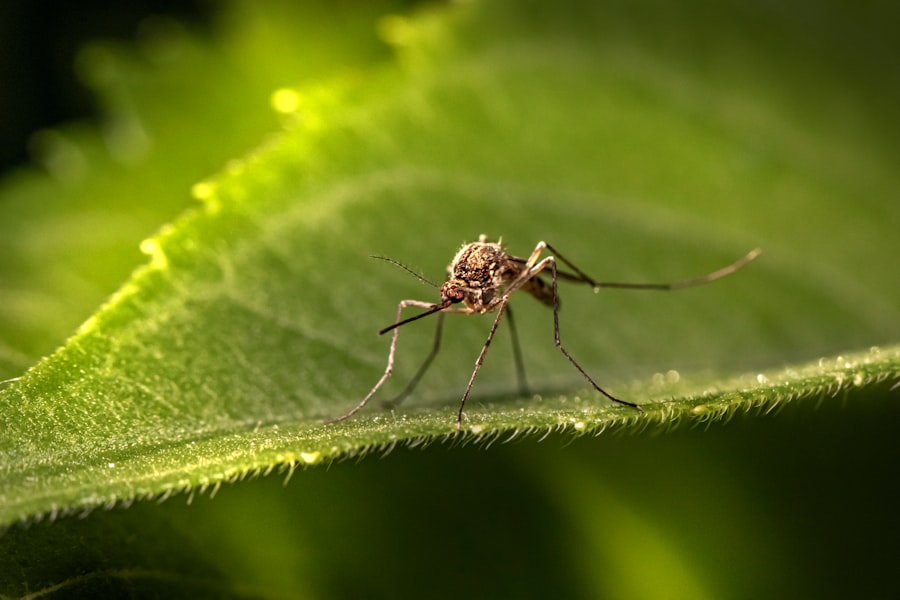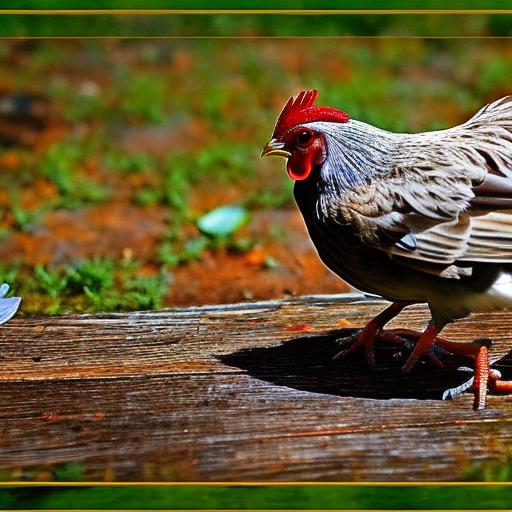Keeping mosquitoes away from chickens is essential for their health and well-being. Mosquitoes can transmit diseases to chickens, causing serious health issues and even death. Additionally, mosquito bites can cause discomfort and stress to chickens, affecting their overall quality of life. Therefore, it is crucial for chicken owners to take measures to protect their flock from mosquitoes.
Key Takeaways
- Mosquito bites can pose health and safety risks to chickens.
- Chemical and natural mosquito repellents are available for use on chickens.
- Spraying Off is a common mosquito repellent, but it has pros and cons.
- Safety guidelines should be followed when using Spraying Off on chickens.
- Alternatives to Spraying Off include other methods of mosquito control.
The Risks of Mosquito Bites for Chickens: Health and Safety Concerns
Mosquito-borne diseases can have a significant impact on the health and safety of chickens. Some common mosquito-borne diseases that can affect chickens include avian malaria, West Nile virus, and Eastern equine encephalitis. These diseases can cause symptoms such as fever, weakness, loss of appetite, and respiratory distress in chickens.
Avian malaria is caused by a parasite transmitted by mosquitoes. It can lead to anemia, weight loss, and even death in chickens. West Nile virus is another mosquito-borne disease that can affect chickens. It can cause neurological symptoms such as tremors, paralysis, and even death. Eastern equine encephalitis is a viral disease that can also be transmitted by mosquitoes. It can cause neurological symptoms and high mortality rates in chickens.
Common Mosquito Repellents: Chemical and Natural Options
There are various mosquito repellents available on the market that can be used to keep mosquitoes away from chickens. These repellents can be categorized into chemical and natural options.
Chemical repellents for mosquitoes often contain ingredients such as DEET or picaridin. These chemicals work by interfering with the mosquito’s ability to detect humans or animals through their sense of smell. While chemical repellents can be effective in repelling mosquitoes, they may also have potential risks and side effects.
Natural repellents for mosquitoes are a safer alternative for use around chickens. These repellents often contain ingredients such as citronella, eucalyptus, or lavender. These natural ingredients work by masking the scent of chickens, making them less attractive to mosquitoes. Natural repellents are generally considered safe for use around chickens and do not pose any significant health risks.
The Pros and Cons of Spraying Off on Chickens: What You Need to Know
Spraying Off is a popular mosquito repellent that is commonly used on chickens. It contains the chemical permethrin, which is known for its effectiveness in repelling mosquitoes. However, there are both benefits and risks associated with using Spraying Off on chickens.
One of the main benefits of using Spraying Off on chickens is its effectiveness in repelling mosquitoes. It can provide long-lasting protection against mosquitoes, reducing the risk of mosquito-borne diseases in chickens. Additionally, Spraying Off is easy to apply and can be sprayed directly onto the feathers of chickens.
However, there are also risks and drawbacks associated with using Spraying Off on chickens. Permethrin, the active ingredient in Spraying Off, can be toxic to cats and fish. Therefore, it is important to keep cats away from treated chickens and avoid spraying near bodies of water. Additionally, some studies have suggested that repeated exposure to permethrin may have negative effects on the health of chickens.
Precautions to Take When Using Spraying Off on Chickens: Safety Guidelines
When using Spraying Off on chickens, it is important to follow safety guidelines to minimize any potential risks. Firstly, it is crucial to read and follow the instructions provided by the manufacturer carefully. This will ensure that you are using the product correctly and safely.
It is also important to wear protective gear when applying Spraying Off on chickens. This includes gloves, goggles, and a mask to protect yourself from any potential exposure to the chemical. Additionally, it is recommended to apply Spraying Off in a well-ventilated area to minimize inhalation of the product.
Furthermore, it is important to keep cats away from treated chickens to prevent any potential toxicity. Cats are more sensitive to permethrin than other animals, and even small amounts of exposure can be harmful to them. Therefore, it is best to keep cats indoors or in a separate area while treating chickens with Spraying Off.
How to Apply Spraying Off on Chickens: Tips and Techniques

When applying Spraying Off on chickens, there are certain steps and techniques that can help ensure effective coverage. Firstly, it is important to thoroughly spray the feathers of the chickens, paying special attention to areas where mosquitoes are likely to bite, such as the head, neck, and legs.
It is also important to apply Spraying Off evenly and avoid over-saturating the feathers. This will help ensure that the product is distributed evenly and does not cause any discomfort or irritation to the chickens. Additionally, it is recommended to apply Spraying Off during the cooler parts of the day when mosquitoes are most active.
Furthermore, it is important to reapply Spraying Off as directed by the manufacturer. The effectiveness of the product may diminish over time, so regular reapplication is necessary to maintain protection against mosquitoes.
Frequency of Application: How Often Should You Spray Off on Chickens?
The recommended frequency of application for Spraying Off on chickens may vary depending on various factors. These factors include the level of mosquito activity in your area, the size of your flock, and the duration of protection provided by the product.
In general, it is recommended to apply Spraying Off every 7-14 days for optimal protection against mosquitoes. However, if you live in an area with high mosquito activity or have a larger flock, more frequent applications may be necessary. It is best to monitor the mosquito activity in your area and adjust the frequency of application accordingly.
Alternatives to Spraying Off on Chickens: Other Methods of Mosquito Control
While Spraying Off is a popular choice for mosquito control on chickens, there are also other methods available that can be used as alternatives. These methods include natural mosquito control options and other chemical mosquito repellents.
Natural methods of mosquito control include removing standing water from your property, as mosquitoes breed in stagnant water. Additionally, planting mosquito-repellent plants such as citronella or lavender can help deter mosquitoes. Using mosquito nets or screens around chicken coops can also provide protection against mosquitoes.
Other chemical mosquito repellents for chickens may contain different active ingredients than Spraying Off. These repellents may have varying levels of effectiveness and potential risks. It is important to read and follow the instructions provided by the manufacturer when using any chemical repellent on chickens.
Monitoring the Effectiveness of Spraying Off on Chickens: Signs to Look Out For
When using Spraying Off on chickens, it is important to monitor its effectiveness to ensure that it is working as intended. There are certain signs that you can look out for to determine if Spraying Off is effectively repelling mosquitoes.
One sign that Spraying Off is working effectively is a decrease in mosquito activity around your chickens. If you notice a significant reduction in the number of mosquitoes around your flock, it is a good indication that the product is working.
Additionally, if your chickens show no signs of mosquito-borne diseases such as fever, weakness, or respiratory distress, it suggests that they are being protected by Spraying Off. Regular health checks and monitoring of your flock’s behavior can help identify any potential issues.
Keeping Your Chickens Safe and Mosquito-Free with Spraying Off
In conclusion, keeping mosquitoes away from chickens is crucial for their health and safety. Mosquito-borne diseases can have serious consequences for chickens, and mosquito bites can cause discomfort and stress. Spraying Off is a popular mosquito repellent that can be used on chickens to provide protection against mosquitoes.
While Spraying Off can be effective in repelling mosquitoes, it is important to follow safety guidelines and take precautions when using the product. Wearing protective gear and keeping cats away from treated chickens are essential to minimize any potential risks.
There are also alternative methods of mosquito control available, including natural options and other chemical repellents. It is important to choose the method that works best for your flock and monitor its effectiveness regularly.
By taking the necessary precautions and using effective mosquito repellents such as Spraying Off, you can keep your chickens safe and mosquito-free, ensuring their overall health and well-being.
If you’re looking for ways to protect your chickens from pesky mosquitoes, you might be interested in this informative article on Poultry Wizard. They discuss a unique solution that can help keep mosquitoes at bay and ensure the well-being of your feathered friends. Find out how you can spray off on your chickens to repel mosquitoes and create a more comfortable environment for them. Check out the article here for more details.
FAQs
What is “spray off”?
“Spray off” is a brand of insect repellent that contains the active ingredient DEET.
Can I use “spray off” on my chickens to keep mosquitoes away?
No, it is not recommended to use “spray off” or any other insect repellent on chickens. These products are designed for use on humans and can be harmful to animals.
What are some safe ways to keep mosquitoes away from my chickens?
There are several safe and effective ways to keep mosquitoes away from your chickens, including using mosquito netting around their coop, removing any standing water from your property, and using natural mosquito repellents like citronella or lavender.
Why is it important to keep mosquitoes away from my chickens?
Mosquitoes can transmit diseases to chickens, including West Nile virus and avian malaria. Additionally, mosquito bites can be uncomfortable and cause irritation for your birds.
What are some signs that my chickens may have contracted a mosquito-borne illness?
Signs of mosquito-borne illnesses in chickens can include lethargy, loss of appetite, difficulty breathing, and neurological symptoms like tremors or seizures. If you suspect your chickens may be sick, it is important to consult with a veterinarian.
Meet Walter, the feathered-friend fanatic of Florida! Nestled in the sunshine state, Walter struts through life with his feathered companions, clucking his way to happiness. With a coop that’s fancier than a five-star hotel, he’s the Don Juan of the chicken world. When he’s not teaching his hens to do the cha-cha, you’ll find him in a heated debate with his prized rooster, Sir Clucks-a-Lot. Walter’s poultry passion is no yolk; he’s the sunny-side-up guy you never knew you needed in your flock of friends!







